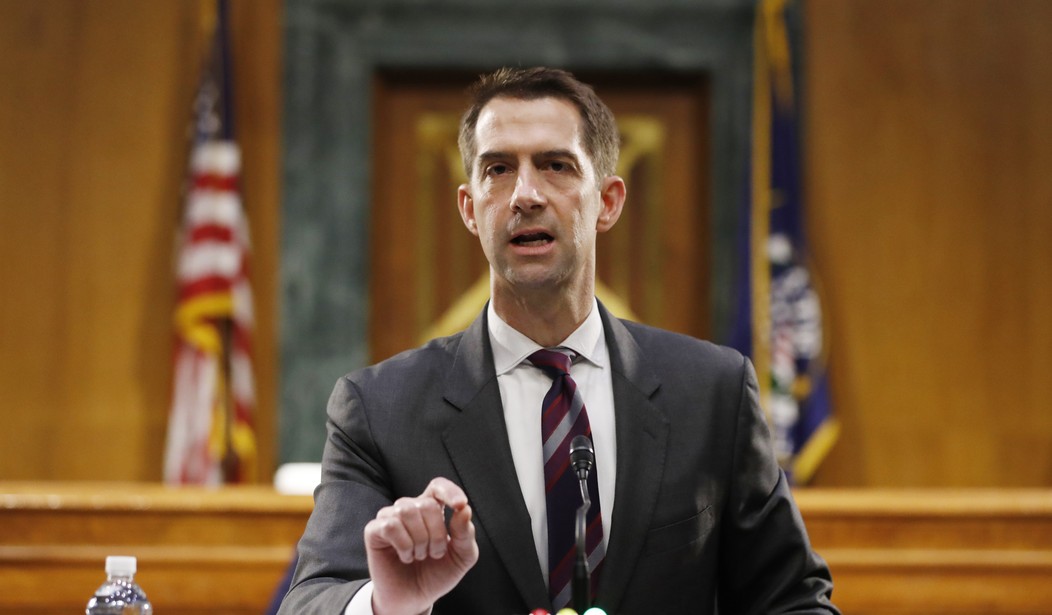On Sunday night, Sen. Tom Cotton (R-Ark.) announced that he would not vote to block the counting of Electoral College votes on Wednesday, January 6, because any such obstruction would only “embolden” Democrats to undermine the Constitution further. He acknowledged serious concerns about election irregularities, but he insisted that it is not Congress’s job to elect the president in these circumstances.
“I share the concerns of many Arkansans about irregularities in the presidential election, especially in states that rushed through election-law changes to relax standards for voting-by-mail. I also share their disappointment with the election results. I therefore support a commission to study the last election and propose reforms to protect the integrity of our elections,” Cotton began.
The senator predicted that Sens. Kelly Loeffler (R-Ga.) and David Perdue R-Ga.) will prevail in the Georgia Senate runoffs and urged the Senate to hold more election hearings after their victories. “All Americans deserve to have confidence in the elections that undergird our free government,” he insisted.
“Nevertheless, the Founders entrusted our elections chiefly to the states—not Congress,” Cotton argued. “They entrusted the election of our president to the people, acting through the Electoral College—not Congress. And they entrusted the adjudication of election disputes to the courts—not Congress. Under the Constitution and federal law, Congress’s power is limited to counting electoral votes submitted by the states.”
If Congress were to overturn the results of the Electoral College, Cotton argued, it would help Democrats undermine the Constitution’s protections for smaller states and lead to more federalized election laws.
“If Congress purported to overturn the results of the Electoral College, it would not only exceed that power, but also establish unwise precedents,” he argued.
First, Congress would take away the power to choose the president from the people, which would essentially end presidential elections and place that power in the hands of whichever party controls Congress. Second, Congress would imperil the Electoral College, which gives small states like Arkansas a voice in presidential elections. Democrats could achieve their longstanding goal of eliminating the Electoral College in effect by refusing to count electoral votes in the future for a Republican president-elect. Third, Congress would take another big step toward federalizing election law, another longstanding Democratic priority that Republicans have consistently opposed.
Therefore, the senator announced he “will not oppose the counting of certified electoral votes on January 6.”
He concluded his remarks with praise for President Donald Trump and a warning about unscrupulous Democrats who would use this precedent to erode the Constitution.
“I’m grateful for what the president accomplished over the past four years, which is why I campaigned vigorously for his reelection. But objecting to certified electoral votes won’t give him a second term—it will only embolden those Democrats who want to erode further our system of constitutional government,” Cotton warned.
Cotton’s decision not to block the counting stands out because the Arkansas senator represents one of the loudest populist voices in the Republican Party. His fellow populist Sen. Josh Hawley (R-Mo.) has announced his support for blocking the count, as has Sen. Ted Cruz (R-Texas). Cruz has demanded a special commission to study election irregularities before January 20, when a new president must be sworn in.
Cruz’s proposal is less radical than many suggest, but it would still make Congress a check on the Electoral College and undermine states’ constitutional rights to choose their own electors. Cruz’s call for an investigation is right, but his method of forcing it may set the horrible precedents Cotton warns about.
While Trump and others may have exaggerated claims of election fraud and irregularities, the 2020 presidential election was indeed plagued with last-minute changes to election procedures, insecure storage of ballots, and more. While it is utterly shameful for legacy media outlets to claim there are no concerns about the 2020 election, it is unlikely that Americans will be able to know just how many votes were affected and whether or not Joe Biden truly won the election.
It is also unlikely that Trump or his allies will be able to prove that the president won reelection. It seems likely Biden will become president on January 20, and conservatives will have to mobilize to defeat Kamala Harris in 2024.
Republicans should heed Cotton’s warning. Should a Republican prevail in the 2024 presidential election, Democrats would likely use this precedent to undermine him or her. Americans should also demand an investigation into the 2020 election and reforms on the state level to prevent this kind of fiasco from ever happening again. Americans must have confidence in their elections, and that is more important than which candidate ultimately prevails.
Tyler O’Neil is the author of Making Hate Pay: The Corruption of the Southern Poverty Law Center. Follow him on Twitter at @Tyler2ONeil.









Join the conversation as a VIP Member